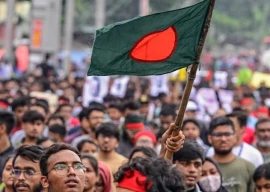
The move came just hours after prosecutors received criminal complaints against the deposed president and other senior supporters, and as the new prime minister planned further talks on forming his cabinet.
The inquiry launched on Sunday relates to the escape by Morsi and dozens of Brotherhood members from Wadi Natrun prison during the uprising that ended former president Hosni Mubarak's three-decade rule.
A court in June found that Hamas rulers of Gaza and Lebanon's Shiite Hezbollah movement had helped the prisoners in their escape.
State Security prosecution service investigators interviewed Morsi at an undisclosed location, the judicial sources said.
Morsi, Egypt's first freely elected president, has not been seen in public since the military coup that toppled him on July 3 after millions took to the streets calling on him to step down.
Interim leaders say he is being held at a "safe place, for his own safety".
On Saturday, the public prosecutor's office said it was examining complaints filed against Morsi, Brotherhood supreme leader Mohamed Badie and others, with a view to launch a formal investigation.
The complaints include spying, incitement to violence and damaging the economy, although the prosecutor's office did not say who had made the allegations.
Caretaker premier Hazem al-Beblawi was due to continue talks on Sunday with candidates for ministerial posts, accompanied by vice president Mohamed ElBaradei.
Beblawi said he expected the cabinet to have 30 ministries, the top priorities being to restore security, ensure the flow of goods and services and prepare for parliamentary and presidential elections.
Interim president Adly Mansour had set a timetable for elections by early next year, according to a roadmap drafted by the military.
The new cabinet could be unveiled by Tuesday or Wednesday.
Increasing tensions
The Brotherhood has refused to join an interim government and tens of thousands of supporters have taken to the streets demanding Morsi's reinstatement.
During his single year of turbulent rule, Morsi was accused of concentrating power in Brotherhood hands, sending the economy into freefall and failing to protect minorities.
But his supporters say his overthrow was a military coup and an affront to democracy.
"There will be another mass protest on Monday," Tareq al-Morsi, a Brotherhood spokesperson, said on Saturday.
In one planned protest, demonstrators will march to the Cairo headquarters of the elite Republican Guard - the scene of deadly violence seven days earlier, said the spokesperson. But he insisted it would be a peaceful protest.
Morsi's overthrow after nationwide protests demanding his resignation plunged Egypt into a vortex of violence.
In the worst single incident, clashes outside the Republican Guard headquarters last Monday killed 53 people, mostly Morsi supporters.
The Brotherhood accuses the army of "massacring" its activists, while the military says soldiers were attacked by "terrorists" and armed protesters.
Human Rights Watch called for an impartial investigation of military officers and police over the killings, "independent both institutionally and practically from the military chain of command".
"Witness after witness described the military shooting into the crowd, including at unarmed people. The government needs to find out who was responsible and hold them to account," said HRW's regional director Joe Stork.
International Reaction
Washington and Berlin have both called on the military to release Morsi.
State Department spokeswoman Jen Psaki said the United States wanted "an end to restrictions on Mr Morsi's whereabouts".
Germany suggested the International Committee of the Red Cross should be granted access to him.
In Cairo's Nasr City, tens of thousands of protesters gathered on Friday outside the Rabaa al-Adawiya mosque to pray and break their fast on the first weekend of the holy month of Ramadan.
Morsi supporters have been camping outside the mosque, where many Brotherhood leaders have been holed up, some wanted by authorities.
Firebrand preacher Safwat Hegazi, wanted for questioning by police along with other top Brotherhood members on suspicion of incitement, said the crowds would protest for "one or two months or even one or two years".
In a telephone call with Saudi King Abdullah on Friday, US President Barack Obama expressed "serious concern" about the violence since Morsi's overthrow, the White House said. Obama underscored the need to return to a democratically elected civilian government.
COMMENTS (1)
Comments are moderated and generally will be posted if they are on-topic and not abusive.
For more information, please see our Comments FAQ








1730884134-0/BeFunky-collage-(26)1730884134-0-270x192.webp)








One dictator killed Hasan Al Banna and now gonna killed Mohammad Al Mursi..